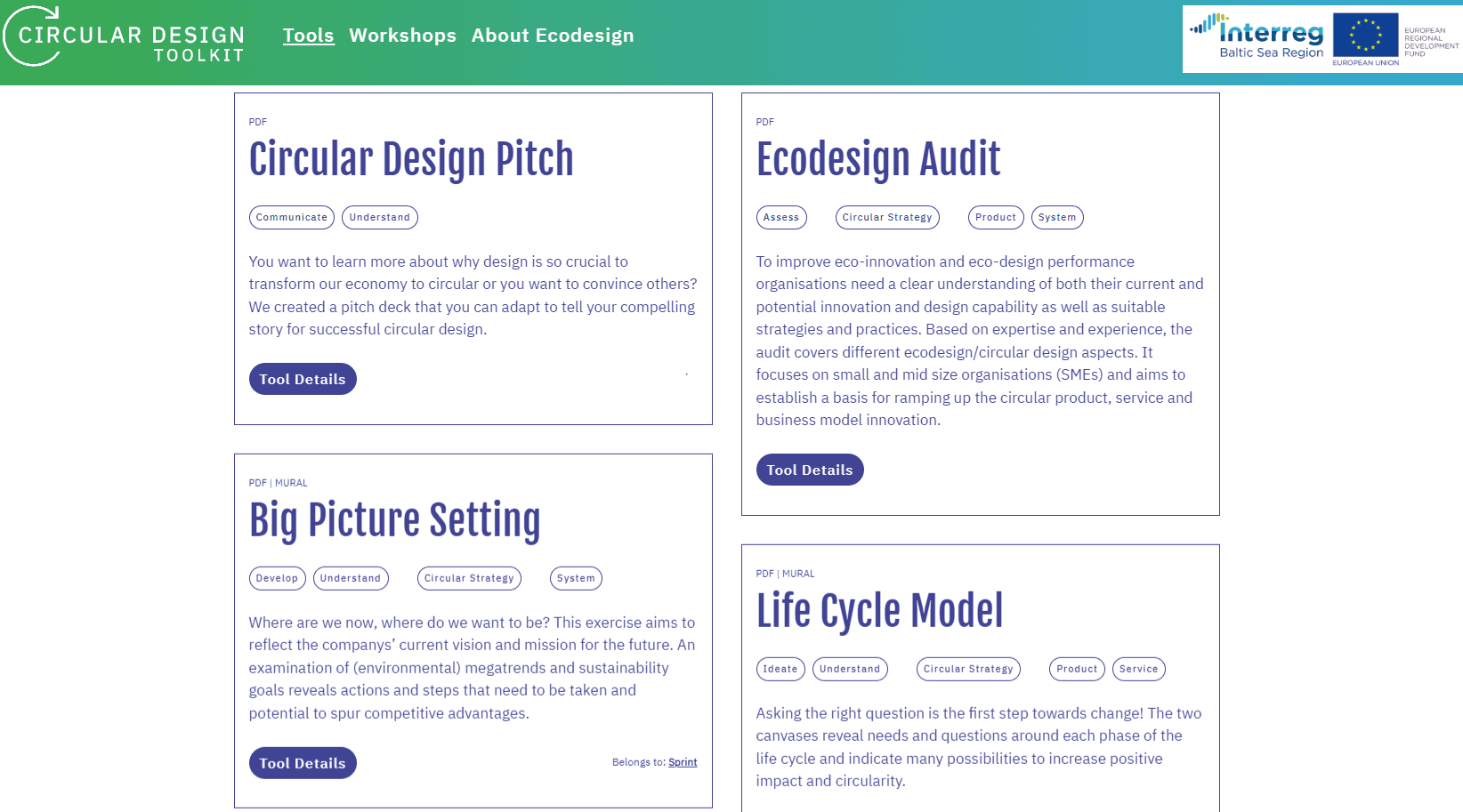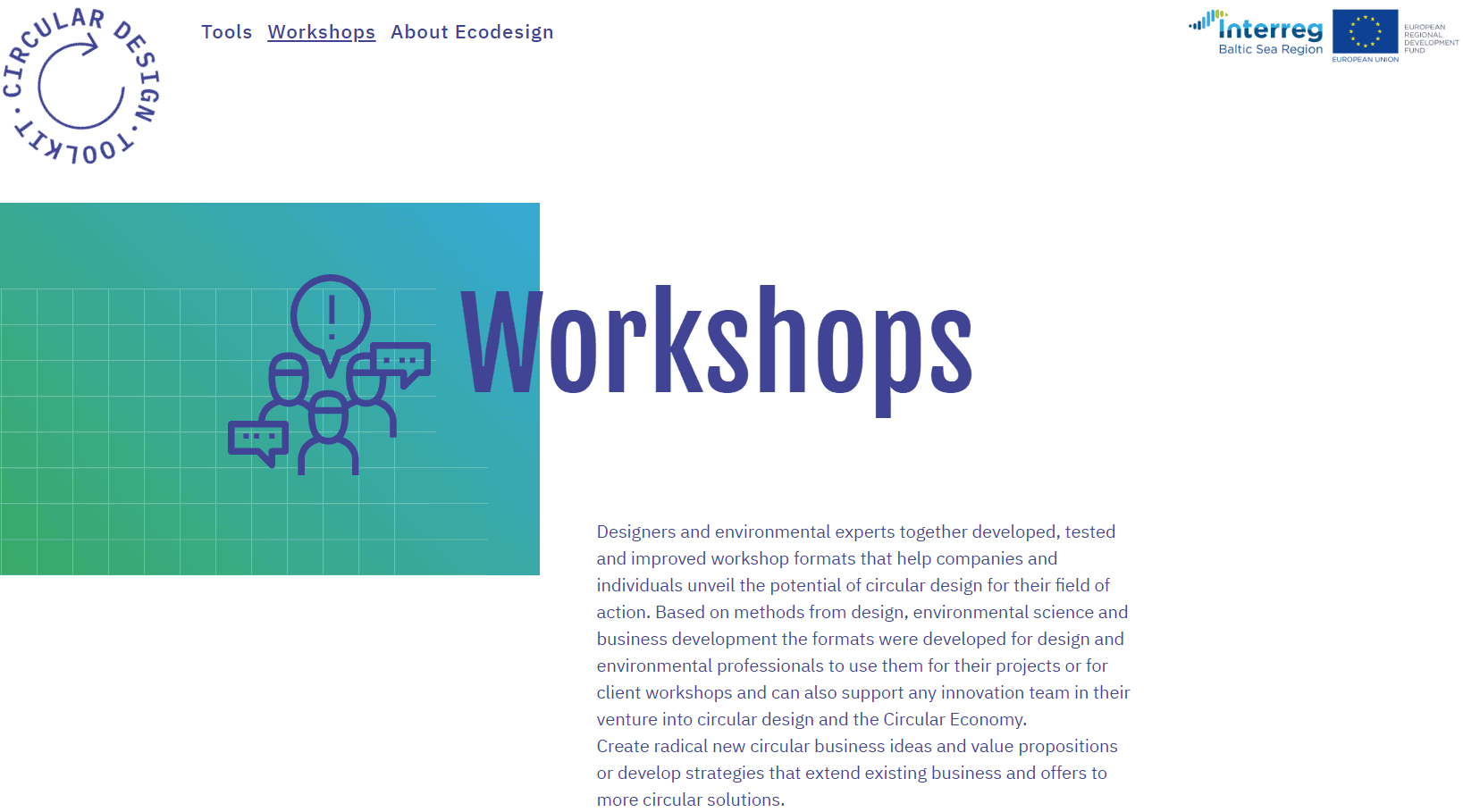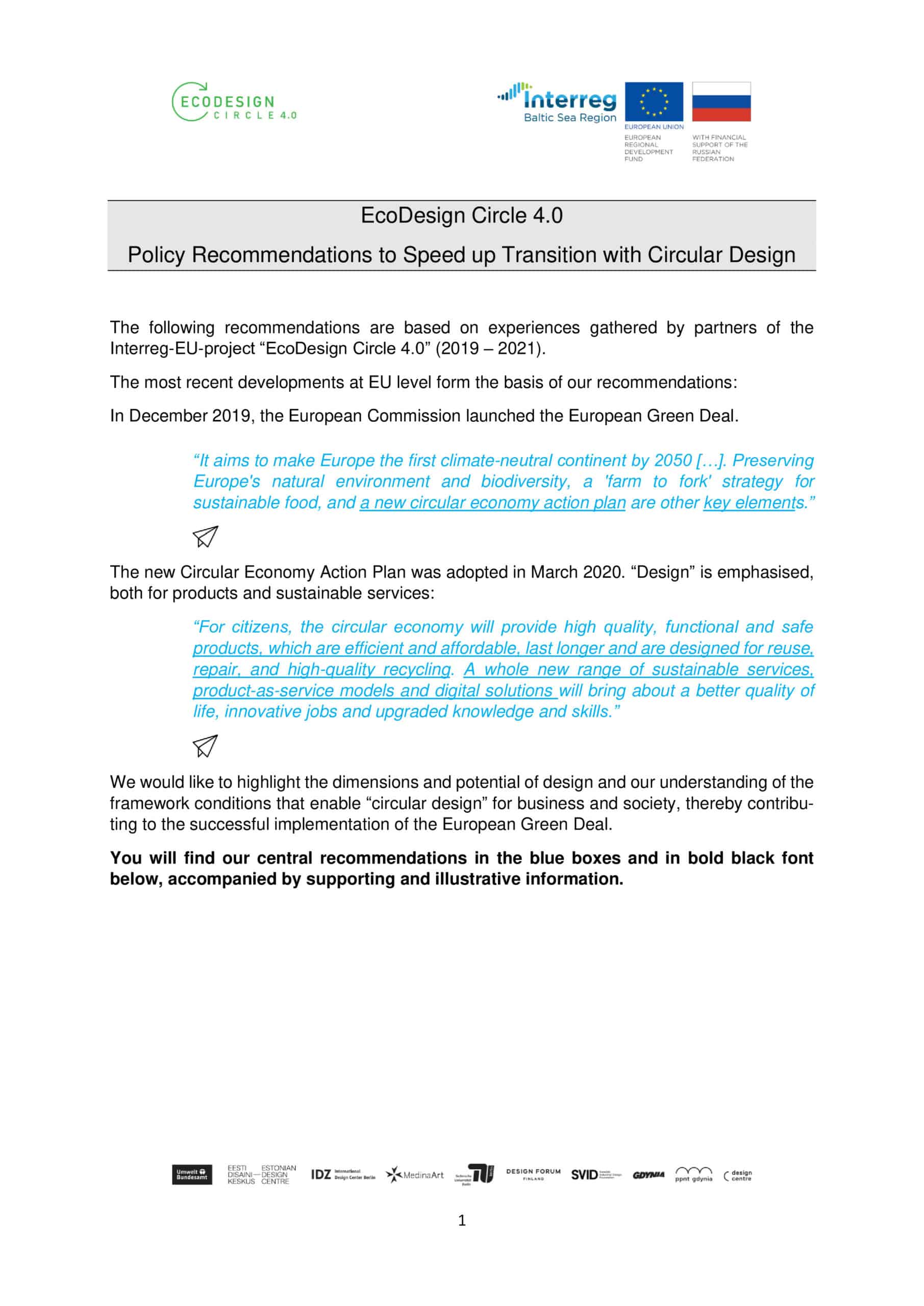EcoDesign Circle 4.0
Eco-design is design for a circular economy
Eco-design is one way to move our societies towards a circular economy. An eco-designed product is designed in a way that it lasts long, can be easily repaired and at the end of its life, it can be rapidly disassembled and its materials can be managed through existing recycling systems without leaving behind harmful waste. Eco-design items of today are by and large non-technological, often mass products for everyday life, e.g. plates, pillows, clothes or benches.
Eco-design knowledge needs to be translated into business reality
Until recently, eco-design was only sparsely applied. Small and medium-sized enterprises are focused on traditional linear business models in which products are short-lived and materials are typically discarded as waste. However, know-how concerning the environmental impact of products, how to assess the impact and how to reduce it is available. The challenge is to translate environmental science into business reality.
Professional networks for design can make a difference
Design centres from five countries around the Baltic Sea got together with environmental scientists to expand their eco-design expertise and to promote the use of eco-design among their national networks of design companies. Design centres are typically non-profit networks or associations for design professionals. Most design centres lacked the instruments to support their affiliate companies in eco designing innovative products. The design centres’ primary aim was to introduce and expand the use of eco-design among designers and bring it into the core operations of companies.
EcoDesign Circle 4.0 focuses on services and digital platforms
The project EcoDesign Circle recently set up a Learning Factory Ecodesign. In addition, it helped to improve the competencies of design centers, industrial designers and companies to develop circular products. EcoDesign Circle 4.0 goes beyond products by targeting services for a circular economy and spreads the knowledge gained in a train-the-trainer package.
Budgets
in numbers
-
0.77MillionTotal
-
0.51MillionErdf
-
0.09MillionEni + Russia
-
0.00MillionNorway
Achievements
Service and digitalisation in the spotlight
The EcoDesign Circle 4.0 project gathered design centres, design practitioners, research institutions and public authorities from Estonia, Finland, Germany, Poland, Russia and Sweden to apply methods and approaches to the development of circular business solutions in design. The main focus was on developing a service-minded approach and integrating digital technologies in circular business models. The project collected inspiring stories and business cases from different sectors to showcase concrete solutions. Thus, in clothing the partners introduced a digital platform as a service for material suppliers, sorters, recyclers and other users. While in electronics, the partner organisations created a platform for repair solutions for electrical devices. Find out more here.
Training empowers to work sustainably
Besides, the project organised four transnational and two national train-the-trainers workshops for design agencies, service designers, innovation centers, SMEs and other experts from the design and sustainability fields. The focus of the training was on the development of a service approach, how to work sustainably and how to integrate digital technologies in processes. As regards the digital dimension in service offers development, the trainers referred to the emerging digital infrastructure such as web-based platforms, applications, internet of things, blockchain technologies, industry 4.0.
Besides, the focus of the trainings was adapted to the trainees´ needs. While design SMEs learned about the ecological aspects of design, the invited sustainability experts got a chance to better understand designers´ working methods. In addition, the training addressed even public authorities. It aimed to raise their awareness about the circular economy and how ecodesign can contribute to the transition from linear to a circular economy. A better understanding of ecodesign can trigger new funding schemes and resources for ecodesign start-ups.
Transnational outreach matters
The material developed by the preceding project, specifically on audit-sprint approach for SMEs, was further transferred to such geographical areas as Germany and Russia. In Russia, the audit-sprint tool was applied in the wood processing industry and supported the ongoing national transformation to circular economy. In Germany, mutual learning was implemented through transnational pilots. A variety of stakeholders learnt - by observing or doing - how others applied a certain ecodesign approach and then adapted it to their own context in the next pilot. As an example, the team worked on a transnational pilot for a German enterprise in the shared mobility context with an Estonian-German trainer tandem.
Besides, the project transferred best practices through sharing posts via social media, blogs and storytelling. As regards the storytelling, it comprised 36 interview-based cases as well as 8 success stories of the German Ecodesign Award.
Outputs
EcoDesign Service 4.0 Toolset

Train-the-Trainers package

EcoDesign Recommendations for Policy and Finance

Project Stories
-
02.03.2021
5 questions to EcoDesign Circle: RegioStars finalist 2020
One of our Interreg Baltic Sea Region projects, EcoDesign Circle, reached the finals of the RegioStars Awards last year in the category of circular economy. What did the process look like? What did the project like most? And, most importantly, what was the gain for the project? Read the interview below.Read full story -
04.12.2019
What Russian partners do in Interreg projects: 5 examples from the Baltic Sea region
As many as 43 Interreg Baltic Sea Region projects are working together with Russian partners, showcasing that the same cause unites people beyond borders. From innovating businesses to saving energy and improving mobility – Russian partners are active in all thematic fields of the Programme. But what do they actually do?Read full story -
13.10.2021
Making circular production a reality in the Baltic Sea region and beyond
80 % of the environmental impact of a product is determined during the design phase. This means that key decisions for a circular model of production are taken during this early stage. It is thus fundamental to act as early as possible to create products with a sustainable lifecycle which minimise waste. This is what our #MadeWithInterreg project EcoDesign Circle did by bringing together design centres, professionals, companies, and lecturers from eight countries in the Baltic Sea Region to increase their understanding of and capacities in ecodesign.Read full story -
06.12.2021
Showing Europe how ecodesign greens our economy
Reducing waste and ensuring sustainable use of our natural resources can’t be done by one country alone. We need more effective transnational solutions like the two successful examples from the Baltic Sea region and Central Europe show.Read full story
Partners
German Environment Agency
- TownDessau-Roßlau
- RegionDessau-Roßlau, Kreisfreie Stadt
- CountryGermany
- RepresentativeConrad Dorer
- Phone
- E-Mail
- Web
International Design Center Berlin (IDZ)
- TownBerlin
- RegionBerlin
- CountryGermany
- RepresentativeJutta Brinkschulte
- Phone
- E-Mail
- Web
Estonian Design Centre
- TownTallinn
- RegionPõhja-Eesti
- CountryEstonia
- RepresentativeKaire Rannik
- Phone
- E-Mail
- Web
Technische Universität Berlin
- TownBerlin
- RegionBerlin
- CountryGermany
- RepresentativeMax Marwede
- Phone
- E-Mail
- Web
Finnish Society of Crafts and Design / Design Forum Finland
- TownHelsinki
- RegionHelsinki-Uusimaa
- CountryFinland
- RepresentativeAino Vepsäläinen
- Phone
- E-Mail
- Web
SVID, Swedish Industrial Design Foundation
- TownStockholm
- RegionStockholms län
- CountrySweden
- RepresentativeAnna Velander-Gisslen
- Phone
- E-Mail
- Web
Pomeranian Science and Technology Park Gdynia - budgetary unit of the Municipality of Gdynia
- TownGdynia
- RegionTrójmiejski
- CountryPoland
- RepresentativeKarolina Skrzypik
- Phone
- E-Mail
- Web
Medina Art Ltd.
- TownSaint Petersburg
- RegionCity of St. Petersburg
- Country
- RepresentativeMarina Lebedeva
- Phone
- E-Mail
- Web
-
Project managerConrad DorerGerman Environment Agency
-
Legal representativeDaniel SommerGerman Environment Agency
-
Financial managerAndrea RakersGerman Environment Agency
-
Communication managerNatalia KawczyńskaPomeranian Science and Technology Park Gdynia



